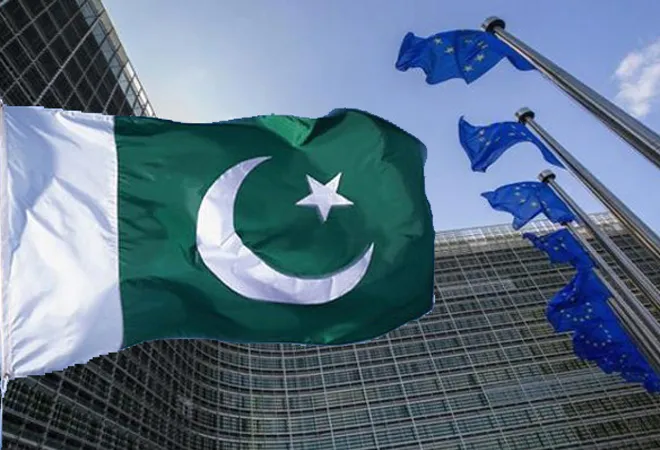 This brief is part of the series, Pakistan: The Unravelling
This brief is part of the series, Pakistan: The Unravelling
Pakistan is no stranger to crisis and is, once again, on the brink. A political crisis of the current magnitude undoubtedly impacts the country’s external relations as well.
Pakistan’s relations with the European Union (EU) have traditionally attracted little global and academic attention. Despite existing bilateral institutionalised frameworks such as the
Pakistan-EU political dialogue and a
Strategic Engagement Plan signed in 2019, the bulk of the relationship continues to centre around trade.
Since January 2014, Pakistan has been a beneficiary of the
EU’s Generalised Scheme of Preferences+ (GSP+)status. The scheme grants lower-income countries preferential tariffs for their exports to support sustainable development in these countries and their integration into the global economy. The GSP+ allows Pakistan to export goods to the EU at zero import duties on
66 percent product tariff lines. Yet the scheme comes with significant strings attached and is conditional on recipient countries effectively implementing
27 international conventions on human rights, labour rights, good governance, and environmental protection. Progress on these areas in beneficiary countries is regularly monitored by civil society actors as well as the European Commission, European Parliament, and representations of the European Council of member states. Thus, the EU’s trade policy on Pakistan resembles a carrot-and-stick approach.
Despite existing bilateral institutionalised frameworks such as the Pakistan-EU political dialogue and a Strategic Engagement Plan signed in 2019, the bulk of the relationship continues to centre around trade.
The EU is Pakistan’s top export partner, with the balance of trade heavily tilted in Europe’s favour—in 2020, the EU
accounted for 16.1 percent of Pakistan’s external trade in goods, while Pakistan merely accounted for 0.3 percent of the EU’s external trade in goods. However, Pakistan’s exports to the EU have consistently risen since the country received GSP+ status. Data
demonstrates how the GSP+ resulted in an increase in EU-Pakistan trade from 6.9 billion euros in 2013 to 12.2 billion euros in 2021, making Pakistan the largest beneficiary amongst all GSP+ countries. In December 2023, Pakistan’s GSP+ status is due to expire, and the EU is currently reviewing whether this should be extended or withdrawn. With the
current political crisis, it is no surprise that Pakistan’s preferential status is under greater scrutiny by the Union.
In 2021, the European Parliament adopted
a non-binding resolution with overwhelming support calling for a review of Pakistan’s GSP+ status based on blasphemy laws and religious intolerance, which were on wide display during the government’s inability to control the
anti-France Islamist protests carried out by the extremist Tehreek-e-Labbaik Pakistan group forcing French companies and citizens to leave the country. Moreover, members of the European Parliament such as Barbara Matera have
emphasised the rampant issue of honour killings and domestic violence against women in the context of the GSP+ extension. A
report from the European Institute for Asian Studies by Tom Wilms also mentions Pakistan’s enduring feudal system of exploitation, which a support scheme like the GSP+ worsens. To top this off, analysts such as Dr Siegfried Wolf from Heidelberg University have
alluded to Pakistan’s actions as a state sponsor of terrorism and called for the GSP+ to be removed “as a possible sanctuary measure towards Pakistan”.
Pakistan to export goods to the EU at zero import duties on 66 percent product tariff lines.
Rampant human rights violations, widespread corruption, religious extremism, restrictions on press freedom, suppression of activists and dissent, violence against protesters, a crackdown on Opposition leaders, suppression of democratic freedoms, blasphemy laws, oppression of minorities, political witch-hunts, collusion with the Afghan Taliban—these are the characteristics of today’s Pakistan, all of which have only exacerbated during the current political turmoil.
Pakistan’s Deputy Foreign Minister Hina Rabbani Khar is busy
visiting Europe in the hope of convincing Europeans of positive internal changes and dispelling fears of the deteriorating human rights situation and crackdowns. But if daily images on our TV screens and social media platforms are anything to go by, the reality is far from this. The Europeans themselves are far from convinced—in April, Sweden indefinitely
shut down its embassy in Pakistan due to security concerns. The European Commission Report assessment of 2018-2019 details how despite some changes such as the enactment of the Transgender Persons Act in 2018, progress has been limited and
“painfully slow” on many conventions, particularly in the areas of implementation and enforcement. The latest
evaluation report from 2014-2023 by the EU monitoring team awaits release. However, going forward, the weakened capacity of the current government led by Prime Minister Shehbaz Sharif and the heavily polarised nature of Pakistani politics could make sustained political focus on fulfilling these commitments only more difficult.
For long, Brussels has
indulged in whitewashing Pakistan’s role in terrorism and South Asian instability, going so far as to regularly host and legitimise the so-called Prime Ministers of Pakistan Occupied Kashmir (PoK). Following the decision by the Financial Action Task Force in 2022, the EU also
removed Pakistan from its list of high-risk countries regarding money laundering and terrorism financing in March this year. It is about time the EU reconsiders this approach.
Pakistan’s Deputy Foreign Minister Hina Rabbani Khar is busy visiting Europe in the hope of convincing Europeans of positive internal changes and dispelling fears of the deteriorating human rights situation and crackdowns.
By granting preferential status to countries that violate basic standards and values of tolerance, rule of law, democracy, and human rights, which are intrinsic to the EU, the Union risks jeopardising its own principles and foundation. Pakistan’s reaping of the rewards of GSP+ without adequate compliance also lessens incentives for countries like Bangladesh that have performed well in several of these areas including labour standards. In addition, extending the GSP+ weakens the cause of international human rights and deters South Asian regional peace. Withdrawal, on the other hand, would be greatly detrimental to Pakistan’s exports and demonstrate the costs of non-compliance, thereby compelling Pakistan to comply. Brexit may play a role here, as a major
implication for Pakistan has been the loss of its loudest supporting voice in Brussels to maintain its GSP+ status.
The EU’s response to the current political crisis
mentions that “Pakistan’s challenges and pathway can only be determined by Pakistanis themselves”. Yet as Pakistan’s largest trading partner and export destination, the GSP+ gives the EU significant leverage to enact positive change in Pakistani society and use the asymmetry in trade relations to its advantage. As Pakistan’s strategic value for Washington diminished after the latter’s withdrawal of its forces from Afghanistan, the EU’s influence on Pakistan may further increase as Islamabad attempts a balancing act in its external relations.
Shairee Malhotra is an Associate Fellow with the Strategic Studies Programme at the Observer Research Foundation
The views expressed above belong to the author(s). ORF research and analyses now available on Telegram! Click here to access our curated content — blogs, longforms and interviews.



 This brief is part of the series,
This brief is part of the series,  PREV
PREV


